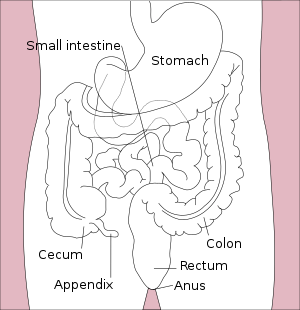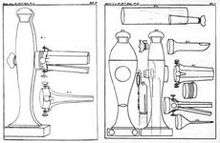Gastroenterology
Gastroenterology[1] is the branch of medicine focused on the digestive system and its disorders.
 Illustration of the stomach, colon and rectum. | |
| System | Gastrointestinal |
|---|---|
| Significant diseases | Gastrointestinal cancers, Gastrointestinal bleeding, Liver cirrhosis, Gallstones, Gastroenteritis, Inflammatory bowel disease |
| Significant tests | Colonoscopy, Stool test, Barium swallows, Endoscopy |
| Specialist | Gastroenterologist |
| Glossary | Glossary of medicine |
Diseases affecting the gastrointestinal tract, which include the organs from mouth into anus, along the alimentary canal, are the focus of this speciality. Physicians practicing in this field are called gastroenterologists. They have usually completed about eight years of pre-medical and medical education, a year-long internship (if this is not a part of the residency), three years of an internal medicine residency, and three years in the gastroenterology fellowship. Gastroenterologists perform a number of diagnostic and therapeutic procedures including colonoscopy, esophagogastroduodenoscopy (EGD), endoscopic retrograde cholangiopancreatography (ERCP), endoscopic ultrasound (EUS), and liver biopsy. Some gastroenterology trainees will complete a "fourth-year" (although this is often their seventh year of graduate medical education) in transplant hepatology, advanced interventional endoscopy, inflammatory bowel disease, motility, or other topics.
Advanced endoscopy, sometimes called interventional or surgical endoscopy, is a sub-specialty of gastroenterology which focuses on advanced endoscopic techniques for the treatment of pancreatic, hepatobiliary, and gastrointestinal disease. Interventional gastroenterologists typically undergo an additional year of rigorous training in advanced endoscopic techniques including endoscopic retrograde cholangiopancreatography, endoscopic ultrasound guided diagnostic and interventional procedures, and advanced resection techniques including endoscopic mucosal resection and endoscopic submucosal dissection. Additionally, the performance of endoscopic bariatric procedures is also performed by some advanced endoscopists.
Hepatology, or hepatobiliary medicine, encompasses the study of the liver, pancreas, and biliary tree, and is traditionally considered a sub-specialty of gastroenterology, while proctology encompasses disorders of the anus, rectum, and colon and is considered a sub-specialty of general surgery.
History

Citing from Egyptian papyri, John F. Nunn identified significant knowledge of gastrointestinal diseases among practicing physicians during the periods of the pharaohs. Irynakhty, of the tenth dynasty, c. 2125 B.C., was a court physician specializing in gastroenterology, sleeping, and proctology.[2]
Among ancient Greeks, Hippocrates attributed digestion to concoction. Galen's concept of the stomach having four faculties was widely accepted up to modernity in the seventeenth century.
Eighteenth century:
- Italian Lazzaro Spallanzani (1729–99) was among early physicians to disregard Galen's theories, and in 1780 he gave experimental proof on the action of gastric juice on foodstuffs.
- In 1767, German Johann von Zimmermann wrote an important work on dysentery.
- In 1777, Maximilian Stoll of Vienna described cancer of the gallbladder.[3][4]
Nineteenth century:
- In 1805, Philipp Bozzini made the first attempt to observe inside the living human body using a tube he named Lichtleiter (light-guiding instrument) to examine the urinary tract, the rectum, and the pharynx. This is the earliest description of endoscopy.[5][6]
- Charles Emile Troisier described enlargement of lymph nodes in abdominal cancer.[7]
- In 1823, William Prout discovered that stomach juices contain hydrochloric acid.[8]
- In 1833, William Beaumont published Experiments and Observations on the Gastric Juice and the Physiology of Digestion following years of experimenting on test subject Alexis St. Martin.
- In 1868, Adolf Kussmaul, a well-known German physician, developed the gastroscope. He perfected the technique on a sword swallower.
- In 1871, at the society of physicians in Vienna, Carl Stoerk demonstrated an esophagoscope made of two telescopic metal tubes, initially devised by Waldenburg in 1870.
- In 1876, Karl Wilhelm von Kupffer described the properties of some liver cells now called Kupffer cells.
- In 1883, Hugo Kronecker and Samuel James Meltzer studied oesophageal manometry in humans.

Twentieth century:
- In 1915, Jesse McClendon tested acidity of human stomach in situ.[9]
- In 1921-22, Walter Alvarez did the first electrogastrography research.[10]
- Rudolf Schindler described many important diseases involving the human digestive system during World War I in his illustrated textbook and is portrayed by some as the "father of gastroscopy". He and Georg Wolf developed a semiflexible gastroscope in 1932.
- In 1932, Burrill Bernard Crohn described Crohn's disease.
- In 1957, Basil Hirschowitz introduced the first prototype of a fibreoptic gastroscope.
Twenty-first century:
- In 2005, Barry Marshall and Robin Warren of Australia were awarded the Nobel Prize in Physiology or Medicine for their discovery of Helicobacter pylori (1982/1983) and its role in peptic ulcer disease. James Leavitt assisted in their research, but the Nobel Prize is not awarded posthumously so he was not included in the award.
Disease classification
1. International Classification of Disease (ICD 2007)/WHO classification:
2. MeSH subject Heading:
3. National Library of Medicine Catalogue (NLM classification 2006):
| Occupation | |
|---|---|
| Names | Doctor, Medical Specialist |
Occupation type | Specialty |
Activity sectors | Medicine |
| Description | |
Education required |
|
Fields of employment | Hospitals, Clinics |
Gastroenterological societies
- World Gastroenterology Organisation
- British Society of Gastroenterology
- United European Gastroenterology
United States
In the United States, gastroenterology is an internal medicine subspecialty certified by the American Board of Internal Medicine (ABIM) and the American Osteopathic Board of Internal Medicine (AOBIM).
Research resources
References
- MeSH heading gastroenterology
- Nunn JF. Ancient Egyptian Medicine. 2002. ISBN 0-8061-3504-2.
- Edgardo Rivera, MD James L. Abbruzzese, MD; Pancreatic, Hepatic, and Biliary Carcinomas, Medical Oncology: A Comprehensive Review
- DeStoll M: Rationis Mendendi, in Nosocomio Practico vendobonensi. Part 1 LugduniBatavarum, Haak et Socios et A et J Honkoop 1788, OCLC 23625746
- Gilger, MA (October 2001). "Gastroenterologic endoscopy in children: past, present, and future". Current Opinion in Pediatrics. 13 (5): 429–34. doi:10.1097/00008480-200110000-00008. PMID 11801888.
- The Origin of Endoscopes, Olympus history
- Anton Sebastian, A Dictionary of the History of Medicine, ISBN 1-85070-021-4
- Prout, W. On the nature of the acid and saline matters usually existing in the stomachs of animals. – Philos. Transactions, 1824, 1, 45.
- McClendon J. F. New hydrogen electrodes and rapid methods of determining hydrogen ion concentrations. – Amer. J. Physoil., 1915, 38, 2, 180.
- Alvarez W. C. The electrogastrogram and what it shows. JAMA, 78(15):1116-18, 1922.